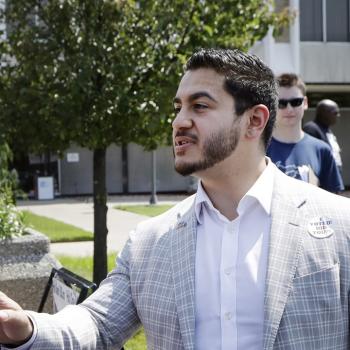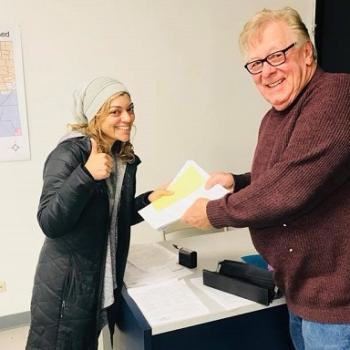 |
|
Arab please!
|
Zarqa Nawaz’ “Little Mosque on the Prairie” is not the only show staring a diverse cast that has recently made history. Comedy Central has just released a new Internet show called “The Watch List“, the first ever American show staring all Arab-American and Iranian-American comics. The show features sketches based on the stand-up acts of well known comedians such as Maz Jobrani, Ahmed Ahmed, and Maysoon Zayid, and finds humor in the everyday lives of Arabs, Iranians, and Muslims in the United States. alt.muslim’s associate editor Zahir Janmohamed interviewed Dean Obeidallah, the show’s co-creator, to talk about the new show and, of course, what possible new jokes could possibly be made about flying while Muslim.
![]() What was the inspiration for creating the show? What are your hopes for it?
What was the inspiration for creating the show? What are your hopes for it?
I created the show with my friend Max Brooks, who is an Emmy Award-winning award winning comedy writer, in the hopes of showing our fellow Americans a funny, positive side of Middle Eastern-Americans. Also, many of the comedians in the show are not only Middle Eastern, but Muslim as well, and I especially think its important that people see Muslim-Americans not playing terrorists like on “24” or “Sleeper Cell”. We want to prove to everyone who watches it that Arabs, Iranians – and Arab/Iranian Muslims – can be funny.
At this point, Comedy Central is very happy with the content and the media attention. (The show was featured in Newsweek, AP and Reuters, to name a few.) They are actually considering a TV pilot for The Watch List so I hope everyone goes to comedycentral.com, or our My Space page, and downloads the show � a lot!
![]() The show brings together some of the foremost comedians who address humor within the Arab and Iranian communities. Who did you have to bribe at Comedy Central to green light a show like this?
The show brings together some of the foremost comedians who address humor within the Arab and Iranian communities. Who did you have to bribe at Comedy Central to green light a show like this?
I was just as amazed as you are that they agreed to give us a shot. However, they felt that it was time. The executives at Comedy Central believe it is commercially viable, plus they have stated publicly that our voice has never been given a chance in mainstream American media. Plus, my partner in this is the son of Mel Brooks, which helped a lot!!
![]() Many African-American comedians talk about how much of their comedy comes from pain � from finding humor in the everyday rigors of enduring racism. To what extent is the humor in this show derived from a similar space of seeking acceptance in society?
Many African-American comedians talk about how much of their comedy comes from pain � from finding humor in the everyday rigors of enduring racism. To what extent is the humor in this show derived from a similar space of seeking acceptance in society?
Our comedy comes exactly from the same place. Our hope is that like other ethnic groups and races before us, we can use comedy to foster understanding about who we are and redefine ourselves in an accurate, positive way. It is similar to Richard Pryor, who used comedy to raise the issues of his day to mainstream audiences. Only time will tell if it works or not for us.
![]() What challenges have you faced in finding acting parts? Is there a point that you reach where you tell yourself, “That’s it. I’m not reading for any more terrorist roles?”
What challenges have you faced in finding acting parts? Is there a point that you reach where you tell yourself, “That’s it. I’m not reading for any more terrorist roles?”
Well, personally I don’t have to deal with that. I look pretty white. My father is Palestinian and my mother is Italian, and I probably should look darker but instead I look like a salesman at Banana Republic (translation: typical white guy). I think its up to each actor to decide what’s right for them. For some, they would rather play the Arab terrorists because they hope to bring some humanity to the role. They know that if they turn it down its likely that a non-Arab – or non-Muslim – will take the role and will not care at all about demonizing us. So it’s a tough call. Hopefully, though, we will create more shows where we can play positive figures. Maybe one day you will even see an Arab-Muslim hero in a movie – inshallah!
![]() Arab and Iranian actors are often marginalized on account of their ethnic identity and frequently cast only in roles that draw upon those identities. By doing this skit show, do you ever worry that it is further casting the actors as only “ethnic comedians,” however problematic that term is?
Arab and Iranian actors are often marginalized on account of their ethnic identity and frequently cast only in roles that draw upon those identities. By doing this skit show, do you ever worry that it is further casting the actors as only “ethnic comedians,” however problematic that term is?
That again is a choice for each comedian to make. Certainly there is a concern of being viewed only as ethnic comic. However, at this point, every appearance by one of us on a major entertainment show is groundbreaking. Once some of us get famous, we can hopefully choose the roles to play.
![]() What advice would you give to someone who is just about to break the news to his parents that after eight years of medical school, he now realizes he wants to be a comedian?
What advice would you give to someone who is just about to break the news to his parents that after eight years of medical school, he now realizes he wants to be a comedian?
I was a lawyer so you are asking the right person. I practiced law for a few years before quitting to become a comedian. I would break it your parents very delicately. Probably by phone from another state would be the best advice. The truth, though, is that you must be true to yourself. If you want to try being a comedian, you can still keep the day job and do comedy at night for a while and make the decision later if it’s the right move. For me, comedy is about making people laugh, but it’s also a form of activism. So it’s a perfect fit for me, since both are very important to me.
Zahir Janmohamed is the co-founder of The Qunoot Foundation and associate editor of altmuslim.com. Several sketches from “The Watch List” can be seen online here.











